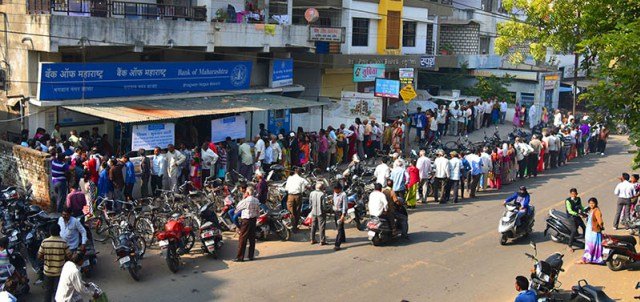Cash is scarce in India. Bitcoin Fire Test
Cash is scarce in India. Bitcoin Fire Test
The Indian government has tried to encourage its citizens to abandon the majority use of cash and go to banking centers, but it is not easy to change people's minds in this millennial land. Bitcoin could be the third way to help revolutionize the economy of the second most populous country on the planet.
On 8 November, the Indian government, led by Prime Minister Narenda Modi, declared unannounced the devaluation of the 500 and 1000 rupee bills, the highest denomination, leaving 86% of all cash in the India.
Since then, queues to withdraw cash tend to infinity and the crisis intensifies in a country where people prefer that their money is consistent and sound.
The measure has been heralded as a plan to force people to access digital banking systems to combat corruption, money laundering and criminal business.

Bank customers wait at a closed ATM while others line long lines to exchange old 500 and 1000 rupees and deposit money in a bank in Nagpur, India. Photograph of Times of India.
Of course, the provision would also help the government implement tax collection: it is estimated that only 3% of Indian people pay income tax.
The measure has been criticized for being ineffective in combating illegally obtained profits but extremely damaging especially for the rural population, because in the countryside the inhabitants depend on cash to survive. Bank customers wait at a closed ATM while others do Long queues to exchange old 500 and 1000 rupees and to deposit money in a bank in Nagpur, India. Photograph of Times of India.
Of course, the provision would also help the government implement tax collection: it is estimated that only 3% of Indian people pay income tax.
The measure has been criticized for being ineffective in combating illegally obtained profits but extremely damaging especially for the rural population, because in the countryside the inhabitants depend on cash to subsist.
Bitcoin in the Cradle of Gandhi
The measures of the inhabitants to escape the collapse have not been made wait. Many have taken advantage of gold, the main asset of support in these crises, whose importation was also prohibited by the Indian government.
More difficult to regulate is Bitcoin and other criptomonedas, that have seen its price to rise well above the averages in other parts of the world.
It is often asserted that Bitcoin, by its economic qualities, is an asset similar to gold, or better. However, bitcoin in India has its disadvantages. It is not possible to buy bitcoins directly in India without declaring bank transactions and identification data ("PAN", Personal Account Number), in addition to all the above mentioned obstacles of Indian infrastructure.
All this did not prevent Bitcoin's prices and trading volumes from firing in India after the announcement of currency devaluation. There is no doubt that governmental measures, without wishing to do so, have led many Indians to Bitcoin.
But there are also other advantages that Bitcoin could offer for Indian merchants. Faced with the general refusal to accept credit in India, many tourism businesses like restaurants and bars lose potential revenue and prefer to avoid paying taxes and get entangled in the nonexistent digital payment technology.
Many tourists have been involved in the chaos following the devaluation of the cash having to resort to their imagination to get out of the bind.
In the dilemma between comfortable, reliable cash, and digital, modern, and ultimately inevitable banking, the widespread use of bitcoin could be the alternative Indian traders need. Free from monetary controls in a country that simply does not recognize the right to privacy, and with the advantages of a globally recognized digital currency that increasingly offers more payment options, bitcoin adoption, if it manages to overcome infrastructure barriers And reluctance to innovate, could be the answer for the 1.3 billion people who are now bursting into a global economy completely dependent on new technologies.
In this test, Bitcoin could become more than a reserve asset for the crisis and could become an active part of one of the largest economies on the planet.
upvoted, followed.